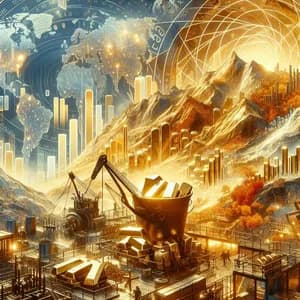Investing in Politics: How 'Red vs. Blue' Shapes Stock Portfolios

Title: The Political Divide Influencing Stock Portfolios: What Investors Need to Know
In today's fast-paced financial landscape, the intersection of politics and investment strategies has never been more pronounced. A recent article highlighted how political affiliations are increasingly impacting stock portfolios, creating a divide among investors. This phenomenon, dubbed the "Red vs. Blue" effect, is reshaping how individuals approach their investments based on their political beliefs.
As stock investors, understanding this trend is crucial. The optimism surrounding the markets often varies significantly between political lines, leading to divergent investment strategies. For instance, investors who align with the Republican party (often characterized by a more pro-business stance) may show greater confidence in sectors such as energy and financial services. Conversely, those leaning towards the Democratic party might favor companies that prioritize sustainability and social responsibility.
Here are a few companies that are currently at the forefront of this political investment divide:
- Exxon Mobil Corporation ($XOM) - As one of the largest publicly traded oil and gas companies, Exxon is often favored by conservative investors who support traditional energy sources. With the recent surge in oil prices and a growing demand for fossil fuels, Exxon stands to benefit significantly.
- NextEra Energy, Inc. ($NEE) - On the flip side, many progressive investors gravitate towards NextEra Energy, a leader in renewable energy. Its focus on wind and solar power resonates with those who prioritize environmental concerns and sustainability in their investment choices.
- JPMorgan Chase & Co. ($JPM) - This financial giant has historically appealed to investors across the political spectrum. However, its recent strategies and economic outlook may resonate more with those who support fiscal conservatism, especially as the Federal Reserve's policies come under scrutiny.
- Tesla, Inc. ($TSLA) - Often viewed as a symbol of innovation and sustainability, Tesla attracts a more liberal investor base. The company's commitment to electric vehicles and renewable energy solutions aligns with the values of those who prioritize environmental impact over traditional profit metrics.
- Goldman Sachs Group, Inc. ($GS) - As a leading investment bank, Goldman Sachs is frequently at the center of political discourse regarding financial regulations and economic policy. Investors may align with the firm based on their views about government intervention in markets.
- BlackRock, Inc. ($BLK) - Known for its focus on ESG (Environmental, Social, and Governance) investing, BlackRock appeals to a politically conscious demographic that prioritizes social responsibility in their portfolios.
The implications of this political divide are profound, shaping not only individual investment decisions but also the broader market dynamics. As stock investors, it is essential to remain aware of these trends and assess how political sentiments might influence market performance.
In conclusion, the "Red vs. Blue" divide is more than just a political issue; it is a financial one that investors cannot afford to ignore. By understanding the companies at the center of these discussions, investors can better navigate the complexities of market sentiment and make informed decisions.
Read more: Red vs. Blue Is Dividing Stock Portfolios Like Never Before




